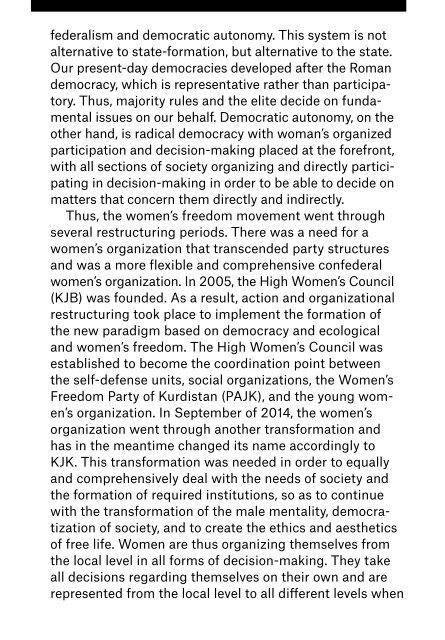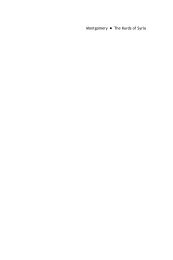Stateless Democracy
1RHiH4Y
1RHiH4Y
You also want an ePaper? Increase the reach of your titles
YUMPU automatically turns print PDFs into web optimized ePapers that Google loves.
federalism and democratic autonomy. This system is not<br />
alternative to state-formation, but alternative to the state.<br />
Our present-day democracies developed after the Roman<br />
democracy, which is representative rather than participatory.<br />
Thus, majority rules and the elite decide on fundamental<br />
issues on our behalf. Democratic autonomy, on the<br />
other hand, is radical democracy with woman’s organized<br />
participation and decision-making placed at the forefront,<br />
with all sections of society organizing and directly participating<br />
in decision-making in order to be able to decide on<br />
matters that concern them directly and indirectly.<br />
Thus, the women’s freedom movement went through<br />
several restructuring periods. There was a need for a<br />
women’s organization that transcended party structures<br />
and was a more flexible and comprehensive confederal<br />
women’s organization. In 2005, the High Women’s Council<br />
(KJB) was founded. As a result, action and organizational<br />
restructuring took place to implement the formation of<br />
the new paradigm based on democracy and ecological<br />
and women’s freedom. The High Women’s Council was<br />
established to become the coordination point between<br />
the self-defense units, social organizations, the Women’s<br />
Freedom Party of Kurdistan (PAJK), and the young women’s<br />
organization. In September of 2014, the women’s<br />
organization went through another transformation and<br />
has in the meantime changed its name accordingly to<br />
KJK. This transformation was needed in order to equally<br />
and comprehensively deal with the needs of society and<br />
the formation of required institutions, so as to continue<br />
with the transformation of the male mentality, democratization<br />
of society, and to create the ethics and aesthetics<br />
of free life. Women are thus organizing themselves from<br />
the local level in all forms of decision-making. They take<br />
all decisions regarding themselves on their own and are<br />
represented from the local level to all different levels when<br />
taking decisions that concern the whole of society. Other<br />
sections of society — the youth, elderly, professionals, the<br />
pious masses, craftworkers — they, too, are organized so<br />
that power and hierarchical formations and structures<br />
cannot be perpetuated, as any attempt is stopped through<br />
such mechanisms.<br />
If the woman’s enslavement has been perpetuated<br />
on three levels — the construction of ideological slavery,<br />
the use of force, and the seizure of the economy from<br />
her — then these three areas must be dealt with<br />
simultaneously as well.<br />
Intellectual Duties and Education<br />
When we look at history, we can trace the enslavement of<br />
women and, subsequently, the whole of society. This development<br />
was first and foremost ideological; indeed, hierarchy<br />
literally means “rule by the priest.” There is a profound<br />
need to expose the history of the colonization of women,<br />
and with it, women’s economic, social, political, and intellectual<br />
colonization. This would mean the exposure of the<br />
history of humanity for the whole of society. The more<br />
science and knowledge were tied down to capital and the<br />
monopoly of power, the more they began to target moral<br />
and political society. Civilization established a monopoly<br />
on both science and knowledge, thus detaching them from<br />
society and especially women. This in turn meant detachment<br />
from life and the environment.<br />
Economy, Industrialism, Ecology<br />
The economy is the third force, after ideology and violence,<br />
through which women and all of society were<br />
entrapped and forced into dependence. Economy literally<br />
means “house-holding.” In the women’s order, however,<br />
66–67



